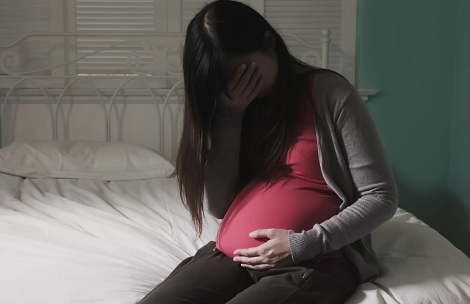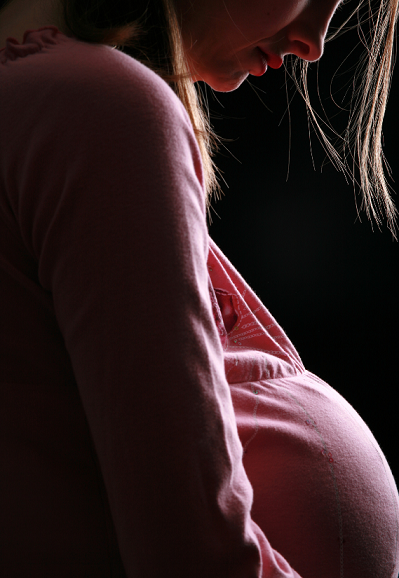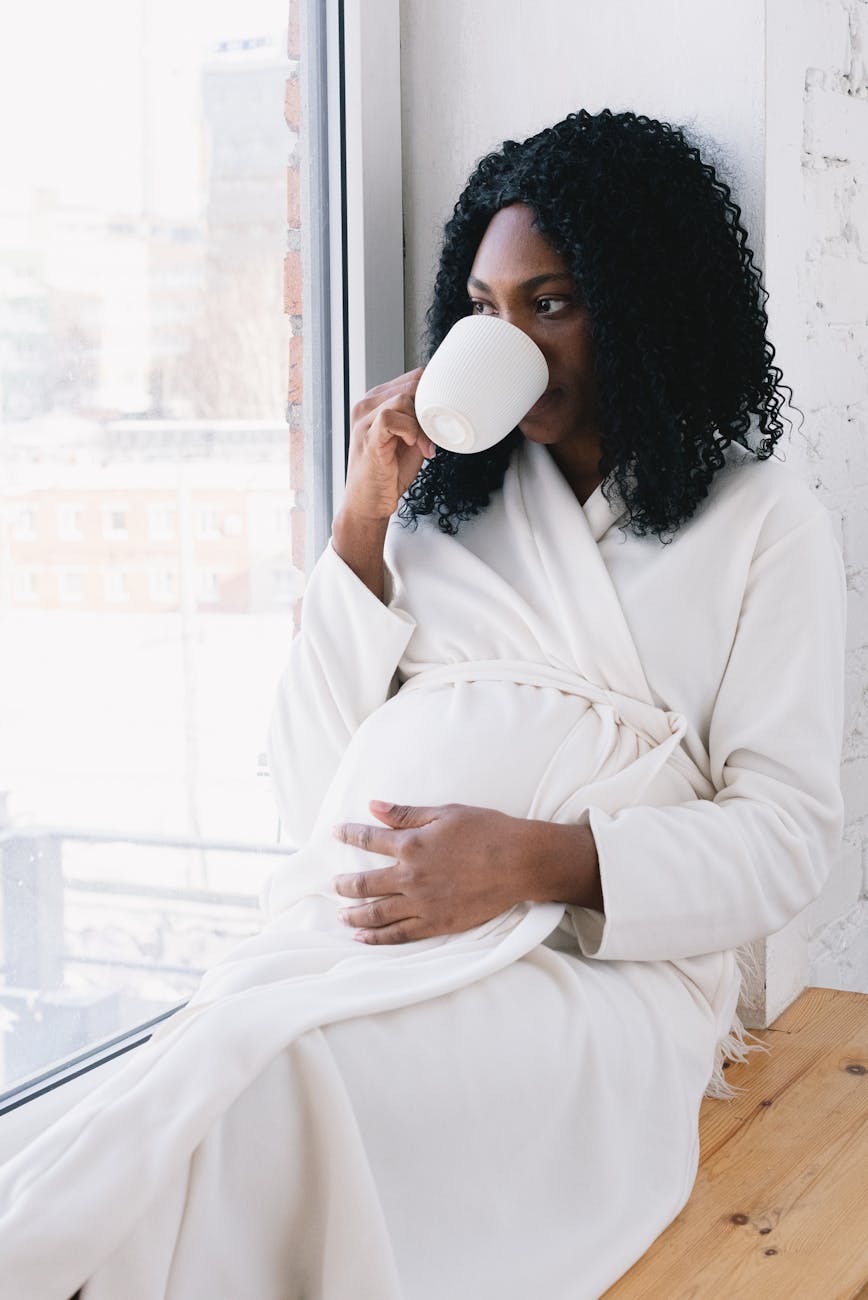
![]() Ginika Oluchi okekeMaternal and Neonatal CareSeptember 27, 2021
Ginika Oluchi okekeMaternal and Neonatal CareSeptember 27, 2021
Depression during pregnancy occurs when a pregnant woman feels sad all the time for weeks or months during the pregnancy. It is otherwise called Antenatal depression (AD).
This may appear strange to a lot of Africans because the general feelings surrounding the expectation of a baby especially in the African worldview is usually that of joy, happiness and other positive emotions.
However, statistics from a 2020 study shows that the prevalence of depression during pregnancy in Africa is 26.3% which means that 1 in 4 pregnant women in Africa is likely depressed.
This is surprisingly a high rate and it is sad that there is not enough awareness on depression during pregnancy or antenatal depression. Just like other forms of depression, signs can be mild, moderate or severe.

As a pregnant woman or someone close to one, the signs enumerated below may be indicative of depression during pregnancy:
1) Overwhelming sadness, worry or hopelessness
2) Lack of interest in day-to-day activities
3) Terrible mood swings and crying easily or for no reason.
4) Eating too little or too much
5) Loss of adequate sleep
6) Emitting negative energy like anxiety and suicidal thoughts.
7) Feeling ugly or worthless.
Although most of these feelings above are not strange with pregnancy, but then, once the incidence of these ill feelings is continuous, then it is possible that they are signals of depression.

In the following lines, this article outlines some common reasons for antenatal depression:
1) Hormonal changes: The body of a pregnant woman undergoes many hormonal changes during the period of pregnancy. For instance, the body produces the female hormones, estrogen and progesterone in much greater amounts during pregnancy. There is also the physical change that comes with carrying another human being: ‘bloated’ tummy, swollen breasts and feet, weight gain, etc. All these changes in the body can combine with the dramatic changes going on in the life of the expectant mother thereby getting her overwhelmed.
2) Economic hardship: Financial worries are an important and common cause of depression during pregnancy. Pregnancy, childbirth and even training up a child are generally expensive. To even have a smooth pregnancy journey, the expectant mother needs adequate nutrition and access to quality antenatal care which requires finances. Therefore, it is most likely that a pregnant woman in tight economic conditions will easily fall into depression.
3) Poor family support: Having dependable family support can help improve mental health of pregnant women. In the same vein, a lack of support from family can trigger antenatal depression. This is commonly seen in cases of unwanted pregnancy.
4) Unfavorable marital conditions: Couple conflicts or partners not being in good terms can lead to depression during pregnancy. Issues such as gender preference of husbands, physical and verbal abuse can lead to antenatal depression as well.

5) Bad obstetric history: Women with a bad obstetric history are most likely to be at an increased risk of antenatal depression. This is directly associated with the mother’s fear of facing similar complications in her current pregnancy like the previous one. Complications or difficulties in former pregnancies can instill fear and anxiety in the expectant mother.
6) Previous mental health problems: A mother’s personal history of depression or other mental health problems is also a common risk factor for antenatal depression. Even having a family history of depression or mental illness contributes to the chances of developing depression during pregnancy.
7) Problems with previous pregnancy: Pregnant women who may have experienced miscarriage or stillbirth in the past are likely to experience antenatal depression in their following pregnancy as a result of the pain and trauma of losing a baby in similar circumstances.
While some women do not experience antenatal depression, there are others who experience postnatal depression instead. What this implies is that many women are at their most emotionally vulnerable states during or after pregnancy. Therefore, it is important to get equipped with the right information on pregnancy-related depression whether before or after childbirth. Ignoring antenatal depression can lead to more cases of postpartum depression if proper care is not taken.
If you found this article helpful, you will also want to read our article on Postpartum Depression: What you should know.
Are you pregnant and think you may be experiencing signs of antenatal depression? Get professional help by Speaking with a Doctor today!

Know that you are not alone. KompleteCare cares.
Congratulations in advance on your bundle of joy!
Telemedicine plays a crucial role in reaching a population of individuals with depression. Depression affects a large portion of adults annually due to socioeconomic or genetic factors. Telemedicine is a platform that involves the use of telecommunications and information technology to provide access to consultation, intervention, and the exchange of digital information.
Telemedicine provides you with access to a distant healthcare professional, like a psychologist, psychiatrist, or therapist. Telemedicine reduces the degree to which your time, energy, and transportation are spent. From the comfort of your home or office, consult a doctor.
1.How can I increase my mental peace during pregnancy?
If you want to avoid depression during pregnancy and also increase your mental peace, ensure you make time each day for yourself.
Make time to enjoy something you love, like you can:
2. Why is pregnancy so hard mentally?
Pregnancy-related stress, physical changes during pregnancy, and daily concerns can all be exhausting. Anxiety, despair, or depression can occasionally occur during pregnancy; they can manifest when you feel sad, melancholy, or agitated for several weeks or months. You may also experience depression even before becoming pregnant, and it may continue during the pregnancy.
3. Is it normal to feel unmotivated during pregnancy?
It is normal to feel unmotivated during pregnancy due to hormonal fluctuations. The hormonal fluctuations result in you feeling fatigue, low energy, and overall drowsiness. Women who have high progesterone level may feel weak and unmotivated, and they may also feel tired if their blood pressure drops.
4. What trimester is the hardest mentally?
For expectant mothers, the third trimester can be emotionally and physically exhausting. It introduces new symptoms like Braxton-Hicks contractions and severe aches and pains, and it brings back some of the most difficult ones from the early stages of pregnancy, such as exhaustion and the constant need to urinate.
5. Can crying and stress affect an unborn baby?
More recently, some research has indicated that stress during pregnancy may have an impact on a baby’s neurobehavioral development and temperament. Babies whose moms had a lot of stress during their pregnancies, especially in the first trimester, exhibit more depressive and irritable symptoms.
Depression during pregnancy is not helpful for you or the unborn baby. A correlation has been found between the cortisol levels of the mother and the fetus, particularly in women who are more nervous or sad. The normal function of the placenta may be altered by the mother’s anxiety or depression, allowing the fetus to absorb extra cortisol.
6. How will a pregnant woman know that she is depressed?
Still, there are other indicators that could point to depression during pregnancy, such as excessive worry for your child, low self-esteem, including inadequate attitudes about being a parent, and the incapacity to get enjoyment from actions that you would typically find delightful.
7. Why has pregnancy made me so depressed?
Particular elements that can lead to depression during pregnancy include:
8. What should a husband not do when a wife is pregnant?
Heavy lifting and pregnant women don’t mix since it puts strain on their backs. Therefore, try your best to relieve her of the burden. Promote healthy living decisions. You can ensure that your partner eats a healthier diet and lower their chance of contracting any foodborne infections.
9. How much do crying and depression affect the fetus?
Depression during pregnancy and low-frequency crying has negative effects on the developing fetus. The detrimental consequences that depression during pregnancy can have on your unborn child are:
Glover, V. (2020). Prenatal mental health and the effects of stress on the foetus and the child. Should psychiatrists look beyond mental disorders?
Okeke, G. O. (2023). The main causes of depression and strategies for coping with depression.
Medibank. (2018). 8 things you should never say to your pregnant partner.
Tommys. (2023). 10 tips to relax in pregnancy.
WebMD. (2024). Fetus to mom: You’re stressing me out!
NutritionFebruary 5, 2025
MedicationFebruary 5, 2025








